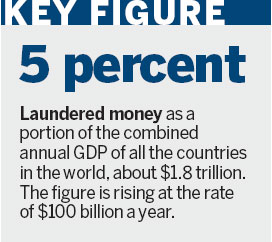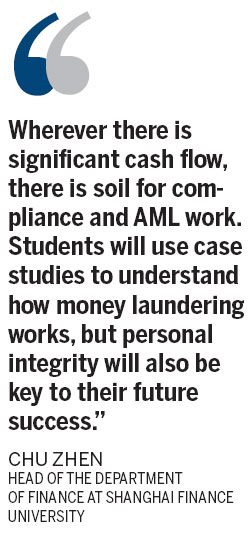Money laundering fight becomes matter of course for students
Updated: 2014-01-16 09:29
By Wu Yiyao (China Daily)
|
||||||||
'Soil for compliance'
Some educational establishments realized the problem existed and began to take action. In 2009, Shanghai Fudan University established postgraduate-level programs in compliance and AML, and cultivated talent to meet the future market demand.
Shanghai Finance University and AML association have been cooperating on the undergraduate program since autumn. Together, they are providing wide-ranging training, including basic AML courses that focus on regulatory requirements in China, the study of global standards and leading practices in the fight against money laundering.
Experts in compliance and AML from across the world will be invited to lecture and provide practical experience, and all the Shanghai Finance University lecturers have been trained by experts from the AML association, according to Dang.

Student will gain hands-on experience through internships at insurers, stockbrokers, financial institutions, auction houses and property developers, according to Chu.
In addition to courses in economics, finance and other compulsory studies for Chinese college students, the first undergraduate compliance and AML majors at Shanghai Finance University will learn by studying cases of illegal financial behavior.
"Wherever there is significant cash flow, there is soil for compliance and AML work. Students will use case studies to understand how money laundering works, but personal integrity will also be key to their future success - we hope students equipped with that sort of knowledge won't get involved in improper deeds," said Chu.
Circumstances can also play a role, however. A report published by Ernst & Young's Fraud Investigation & Dispute Service in August 2013, said: "We are beginning to see a slowdown in growth. Companies are faced with budget cuts and are struggling to meet their targets. Business risks are often heightened in economically hard times."
Weak controls, a tough business environment - which may prompt enterprises to take "shortcuts" to achieve sales or business-growth targets - the use of technology to detect bribery and fraud, and an established, but as yet, immature whistle-blowing program all contribute to compliance risks.
In the Asia-Pacific region and other emerging markets, poor regulatory frameworks and a lack of effective channels for reporting illegal behavior have provided an environment in which illegal financial activities, such as fraud and corruption, are able to flourish.
"The key question for companies in the (Asia-Pacific) region is how to effectively minimize the risk of fraud and corruption in high-risk markets with weak control environments, given the restricted resources," said the E&Y report.
The authorities and businesses have been strengthening measures to combat illegal behavior in economic activity, and funding has been increased to help achieve that goal.
Chinese banks already rate their clients' risk of criminal conduct on a scale of one to five as part of efforts by the People's Bank of China to curb laundering and fraudulent transactions, according to a post on the central bank's official website.

Financial institutions must identify their riskiest clients and use their own discretion to report suspect deals. The accounts of clients assessed as high-risk must be checked frequently and not once every six months, as is the normal practice, the PBOC website said.
In December 2012, the PBOC issued new anti-money laundering rules to all domestic financial institutions, requiring lenders to rate clients based on their location and the nature of their business, including their levels of transparency. A number of insurers and stockbrokerages have also implemented the system.
So far the PBOC has yet to set a deadline for companies to comply with the guidelines.
"In the past, clients were rated against a checklist of money laundering traits, but the list failed to differentiate risk levels. That led financial institutions to unwittingly inundate the authorities with information and false leads that impeded the checks," said a source with a Shanghai-based commercial bank who declined to be named because of the sensitivity of the issue.
The source said that as the PBOC's anti-money laundering rules are implemented, a greater number of professionals are becoming involved in training programs to learn more about AML and the prevalent practices.
Businesses are becoming more attuned to, and knowledgeable about, AML and bribery, according to market insiders.
Foreign businesses were once regulated by the laws of their home countries, but an increasing number are now better prepared and cognizant of the fact that they need to ensure they have good "know-your-customer" policies to tackle AML issues and effective anti-corruption and bribery policies in place, said Dang.
A large number of financial professionals have undertaken intensive training in the relevant programs.

 Guangdong eases way home for workers
Guangdong eases way home for workers
 Wuhan overpass swings into place
Wuhan overpass swings into place
 Detroit auto show features fuel-efficient cars
Detroit auto show features fuel-efficient cars
 Palestinian students show military skills
Palestinian students show military skills
 Cristiano Ronaldo wins FIFA best player award
Cristiano Ronaldo wins FIFA best player award
 Xuelong carries on mission after breaking from floes
Xuelong carries on mission after breaking from floes
 Beijing and Sofia vow new initiatives
Beijing and Sofia vow new initiatives
 71st Golden Globe Awards
71st Golden Globe Awards
Most Viewed
Editor's Picks

|

|

|

|

|

|
Today's Top News
China's airlines ready for rush
Draft law: Clean up air or pay fine
Park venues targeted in corruption drive
IMF faults Congress' budget
Year of the Horse stamp issued
China seeks to calm US fears over missile
Doubt on Tokyo's diplomatic push
China Mobile and Apple 'tie the knot'
US Weekly

|

|






